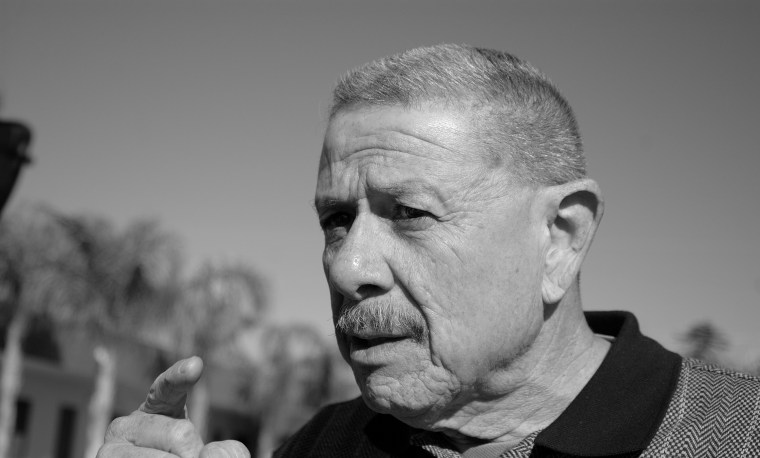Sept. 15 marked the start of National Hispanic Heritage Month — or, as it is known in Spanish, Mes de la Herencia Hispana — a time when the United States pays tribute to the history, culture and contributions of past and present Hispanic Americans.
According to the 2010 Census, 50.5 million Americans identify as Hispanic — and that number is growing. Immigration has long been a part of America’s national history, and the role that immigrants have played — and still play — in building this country is one of the reasons “the American dream” is still shared around the world today. America is a place where new beginnings and new lives are possible.
Over the next month, msnbc.com will be profiling outstanding Hispanic activists who are making a difference in the fight for immigration reform and who are providing critical support services to undocumented communities.
"They provide as best they can the volunteer assistance to meet the needs that are the daily bread of undocumented life in America ... but most importantly they provide hope."'
Name: Alfredo Gutierrez
City, State: Phoenix, Arizona
Occupation/Organization: Writer, lecturer with Puente, and [Former Majority and Minority leader of Arizona State Senate].
How did you get involved with immigration advocacy?
My father was deported during Operation Repatriation in the mid-'30s. He was recruited to return to the U.S. during WWII because of the shortage of underground miners. He returned with my mother and four children (two were my mother's from a prior marriage). I was born shortly thereafter. From the time I can remember, it was drilled into us never to discuss the deportation or the legal status of the family outside the house. That fear became extreme during Operation Wetback in the '50s. Advocating justice for immigrants has seemed like my calling.
Give us a sense of what your day looks like:
My life is notably less exciting than it once was. I was a labor organizer with the farmworkers, majority leader of the Arizona Senate, a successful businessman and, more recently, an immigration activist and organizer. I am 69 now and considered an old man of the movement. I still work closely with organizers such as Carlos Garcia at Puente and Chris Newman at [National Day Laborer Organizer Network (NDLON)] but most of my day is pretty sedentary. I write a Spanish-language column for La Voz, a Gannett publication and online zine. I am working on a second book (the first was "To Sin Against Hope ..."). I travel to northern Mexico on research and spend countless hours at the library.
What is the biggest misconception about immigration reform/undocumented immigrants?
The anti-immigrant nativist organizations against us have always espoused their beliefs that we're criminals, hopelessly unintelligent, disease ridden, lazy, sexually obsessed, and a threat to the purity of American culture. My concern has never been them. They have to be defeated. My concern is the propaganda of our own advocates who have conceded almost every point in order to get comprehensive immigration reform: "We will do jobs that no one else will, we have to learn English, we will get vaccinations, and we will exclude the 'criminals' amongst us from legalization." Unfortunately, it seems that the misconceptions have been accepted by America's Voice, et al.
"My concern is the propaganda of our own advocates who have conceded almost every point in order to get comprehensive immigration reform."'
What is your expectation of President Obama and Congress in regard to the border crisis? Were you surprised by the president’s decision to delay executive action until after the midterms?
The president's immediate reaction to the child refugees foretold the policies to follow and gave an insight into his fundamental beliefs about Latino immigrants. "Send them back," he said, and he advocated repealing existing protections guaranteed to child refugees from Central America so that he could do so expeditiously. He relented under pressure but his intent has been carried out by [U.S. Department of Homeland Security] even without repeal. I was not surprised by the delay. I have been warning over-enthusiastic DREAM organizers about the probability of delay. I am now warning that, in November, Obama will feign belief in a Boehner promise to consider comprehensive immigration reform next year only if he does not take executive action.
What type of help is most needed on the ground and how can one get involved?
Organizations like Puente in Phoenix, Latino Health Access in Santa Ana, California, NDLON and many others work daily with the challenges that the undocumented face daily: Family destruction by deportation, domestic violence, no access to health care, poverty, despair and so much more. They provide as best they can the volunteer assistance to meet the needs that are the daily bread of undocumented life in America ... but most importantly they provide hope. They do that by fiercely fighting back ... what kills hope is accommodating the obvious indifference of this administration and the Democratic party and accepting that the hate of the Republican party is the sole reason for that indifference.
What keeps you motivated every day?
The great Latin American observer Eduardo Galeano wrote "todos los pecados tienen redención menos uno: pecar contra la esperanza." All sins can be forgiven save one: To sin against hope. Hope — hope motivates me every day.
Watch Alfredo on Ronan Farrow Daily
Keep up with Alfredo on Twitter: @AlfredoPhxAZ.
For more, check out Cristina Jimenez's profile: Immigrant rights leader: Obama’s delay on executive action a ‘slap to the face’
